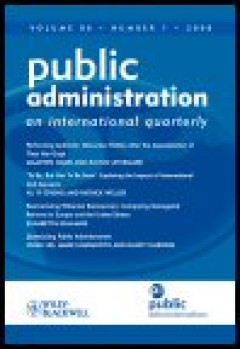Filter by

Anticipating Infertility: Egg Freezing, Genetic Preservation, and Risk
This article discusses the new reproductive technology of egg freezing in the context of existing literature on gender, medicalization, and infertility. What is unique about this technology is its use by women who are not currently infertile but who may anticipate a future diagnosis. This circumstance gives rise to a new ontological category of “anticipated infertility.” The author draws on par…
- Edition
- Vol. 24 no. 4. August 5, 2010.pp. 526-545
- ISBN/ISSN
- 08912432
- Collation
- -
- Series Title
- Gender & Society
- Call Number
- -

POWER AND INTERACTIVE POLICY-MAKING: A COMPARATIVE STUDY OF POWER AND INFLUEN…
A number of countries use forms of interactive policy-making to increase the influence of citizens on decision making. Since there has also been an increase in citizen participation in The Netherlands over the last decade, in this paper, we provide a comparative analysis of 8 interactive projects initiated by the Dutch central government. The central aim of the paper is to understand processes …
- Edition
- Volume 88, Issue 3, September 2010, pages 609–626
- ISBN/ISSN
- 00333298
- Collation
- -
- Series Title
- Public Administration
- Call Number
- -

SCHOLARLY COLLABORATION AND PRODUCTIVITY PATTERNS IN PUBLIC ADMINISTRATION: A…
Previous studies have confirmed the interdisciplinary nature of the field of public administration (Mosher 1956; Ventriss 1991; Forrester 1996; Rodgers and Rodgers 2000; Schroeder et al. 2004) and encouraged the exploration of one important indicator of interdisciplinarity: research collaboration. One way that collaboration patterns are explored is through the study of co-authorship among facul…
- Edition
- Volume 88, Issue 3, September 2010, pages 627–648
- ISBN/ISSN
- 00333298
- Collation
- -
- Series Title
- Public Administration
- Call Number
- -

ORGANIZING THE CORE EXECUTIVE FOR EUROPEAN UNION AFFAIRS: COMPARING FINLAND A…
Examining core executive organization for EU affairs in Finland and Sweden, this article uncovers how change agents used European integration deliberately to strengthen their role in the domestic settings through taking control of EU policy co-ordination. In both countries, EU membership was an exogenous factor that enabled the offices of the PM to secure a more powerful position and advance th…
- Edition
- Volume 88, Issue 3, September 2010, pages 649–664
- ISBN/ISSN
- 00333298
- Collation
- -
- Series Title
- Public Administration
- Call Number
- -

ANALYSING CONTRACTUAL ENVIRONMENTS: LESSONS FROM INDIGENOUS HEALTH IN CANADA,…
Contracting in health care is a mechanism used by the governments of Canada, Australia and New Zealand to improve the participation of marginalized populations in primary health care and improve responsiveness to local needs. As a result, complex contractual environments have emerged. The literature on contracting in health has tended to focus on the pros and cons of classical versus relational…
- Edition
- Volume 88, Issue 3, September 2010, pages 665–679
- ISBN/ISSN
- 00333298
- Collation
- -
- Series Title
- Public Administration
- Call Number
- -

PARALLEL, TRANSFER OR COLLABORATION STRATEGY OF RELATING THEORY TO PRACTICE? …
The relationship between theory and practice is essential to ‘applied sciences' such as public management. However, the current debate on this topic lacks empirical substantiation. Here I develop a methodology for the indication of how the theory-practice gap is actually addressed in a given subfield of management enquiry. I distinguish three archetypal strategies of relating theory to practice…
- Edition
- Volume 88, Issue 3, September 2010, pages 680–705
- ISBN/ISSN
- 00333298
- Collation
- -
- Series Title
- Public Administration
- Call Number
- -

LEADERSHIP STYLE, CRISIS RESPONSE AND BLAME MANAGEMENT: THE CASE OF HURRICANE…
Crisis management research has largely ignored one of the most pressing challenges political leaders are confronted with in the wake of a large-scale extreme event: how to cope with what is commonly called the blame game. In this article, we provide a heuristic to help understand political leader responses to blame in the aftermath of crises, emphasizing the crucial role of their leadership sty…
- Edition
- Volume 88, Issue 3, September 2010, pages 706–723
- ISBN/ISSN
- 00333298
- Collation
- -
- Series Title
- Public Administration
- Call Number
- -

TRACING EXPERIENCES OF NHS CHANGE IN ENGLAND: A PROCESS PHILOSOPHY PERSPECTIVE
For over three decades public services have been the subject of unprecedented change. Nowhere has this been more evident than in the English National Health Service (NHS) where despite the effort expended on change there is growing evidence that such restructuring is largely ineffective. Drawing on a study of culture modification in the English NHS, this paper utilizes Chia's (1999) account of …
- Edition
- Volume 88, Issue 3, September 2010, pages 724–740
- ISBN/ISSN
- 00333298
- Collation
- -
- Series Title
- Public Administration
- Call Number
- -

BEYOND DARK AND BRIGHT: TOWARDS A MORE HOLISTIC UNDERSTANDING OF INTER-GROUP …
Networks are becoming a popular organizational form for structuring human activities. To date, scholars have addressed networks in a variety of fields, including sociology, economics, public administration, criminology, political science, and international security. However, little has been done so far to systematically examine the similarities, differences, and connections between network form…
- Edition
- Volume 88, Issue 3, September 2010, pages 741–763
- ISBN/ISSN
- 00333298
- Collation
- -
- Series Title
- Public Administration
- Call Number
- -

POLITICS BY HEURISTICS: POLICY NETWORKS WITH A FOCUS ON ACTOR RESOURCES, AS I…
Policy network analysis is criticized for being a ‘heuristic’ device, yet ‘heuristic’ methods may be essential to achieve detailed understandings of specific policy outcomes. Rational choice modelling alone cannot perform a similar function. This paper develops a ‘heuristic’ policy network approach that focuses on the analysis of actor resources. Changing contexts can alter the resource distrib…
- Edition
- Volume 88, Issue 3, September 2010, pages 764–781
- ISBN/ISSN
- 00333298
- Collation
- -
- Series Title
- Public Administration
- Call Number
- -

MECHANISMS OF CONFLICT MANAGEMENT IN EU REGULATORY POLICY
In this conceptual article, we explore mechanisms of conflict management in European Union (EU) regulatory policy-making. We build on J.G. March's distinction between aggregation and transformation as the two strategic options to deal with inconsistent preferences or identities that are at the source of social conflict. While this distinction is helpful in mapping conflict management mechanisms…
- Edition
- Volume 88, Issue 3, September 2010, pages 782–799
- ISBN/ISSN
- 00333298
- Collation
- -
- Series Title
- Public Administration
- Call Number
- -

SUPPLIER BEHAVIOUR AND PUBLIC CONTRACTING IN THE ENGLISH AGENCY NURSING MARKET
The worldwide expansion in the use of private firms to deliver public services and infrastructure has promoted a substantial literature on public sector contract and relationship management. This literature is currently dominated by the notion that supplier relationships should be based upon trust. Less prominent are more sceptical approaches that emphasize the need to assiduously manage potent…
- Edition
- Volume 88, Issue 3, September 2010, pages 800–818
- ISBN/ISSN
- 00333298
- Collation
- -
- Series Title
- Public Administration
- Call Number
- -

EXPLAINING THE UNEXPECTED SUCCESS OF THE SMOKING BAN IN ITALY: POLITICAL STRA…
The approval (2003) and enforcement (2005) of a smoking ban in Italy have been viewed by many as an unexpectedly successful example of policy change. The present paper, by applying a processualist approach, concentrates on two policy cycles between 2000 and 2005. These had opposing outcomes: an incomplete decisional stage and an authoritative decision, enforced two years later. Through the anal…
- Edition
- Volume 88, Issue 3, September 2010, pages 819–835
- ISBN/ISSN
- 00333298
- Collation
- -
- Series Title
- Public Administration
- Call Number
- -

TOWARDS GLOBAL SCHOLARSHIP IN PUBLIC AFFAIRS
One can imagine two futures for public administration, public management and public service around the world. A first would be what we see as a continuation of the status quo: with public administration essentially continuing as a series of national discourses, with perhaps a bit of cross-fertilization, but with this characterized by a classic core-periphery model. The preferable model, outline…
- Edition
- Volume 88, Issue 3, September 2010, pages 836–850
- ISBN/ISSN
- 00333298
- Collation
- -
- Series Title
- Public Administration
- Call Number
- -

PERSUASION AS GOVERNANCE: A STATE-CENTRIC RELATIONAL PERSPECTIVE
Debates about governance and the relationship between governance and government have focused upon markets, hierarchies and networks as principal modes of governance. In this paper we argue that persuasion constitutes a further and distinctive mode of governance, albeit one which interpenetrates other modes of governance. In order to assess the nature, limitations and scope of persuasion and the…
- Edition
- Volume 88, Issue 3, September 2010, pages 851–870
- ISBN/ISSN
- 00333298
- Collation
- -
- Series Title
- Public Administration
- Call Number
- -

IMPLEMENTING EVIDENCE-BASED POLICY IN A NETWORK SETTING: ROAD SAFETY POLICY I…
In the early 1990s, in order to improve road safety in The Netherlands, the Institute for Road Safety Research (SWOV) developed an evidence-based ‘Sustainable Safety’ concept. Based on this concept, Dutch road safety policy, was seen as successful and as a best practice in Europe. In The Netherlands, the policy context has now changed from a sectoral policy setting towards a fragmented network …
- Edition
- Volume 88, Issue 3, September 2010, pages 871–884
- ISBN/ISSN
- 00333298
- Collation
- -
- Series Title
- Public Administration
- Call Number
- -

Market-Based Government and the Decline of Organizational Ethics
This article discusses ethical challenges posed by market-based government and the degree to which contracting enhances or diminishes government’s ability to ensure that organizations that deliver public services adhere to ethical practices and public values, such as lawfulness, transparency, and accountability. A case study of an organization—Blackwater (now, Xe)—vividly illustrates the consid…
- Edition
- Vol. 42 no. 6, October 2010.pp. 615-637
- ISBN/ISSN
- 00953997
- Collation
- -
- Series Title
- Administration & Society
- Call Number
- -

Belonging, Believing, Behaving: The Religious Character of Public Servants
How do public servants compare to the general public in their religious affiliation, beliefs, and behaviors? Using data from the 2004 General Social Survey, we compare public servants in government and outside government to the general public through a series of logistic regression models. Although there is little difference in terms of denominational affiliation, public servants have a stronge…
- Edition
- Vol. 42 no. 6, October 2010.pp. 694-719
- ISBN/ISSN
- 00953997
- Collation
- -
- Series Title
- Administration & Society
- Call Number
- -

Public–Private Partnership in Poland:A Cosmological Journey
A language barrier prevents us from understanding how other cultures look at public administration, as “semantic fields” differ between languages. These differences can never be fully grasped, but what we can do is study what happens when a particular concept crosses the border. In this article we select a concept, public–private partnership, that in recent times migrated from one administrativ…
- Edition
- Vol. 42 no. 6. October 2010.pp. 668-693
- ISBN/ISSN
- 00953997
- Collation
- -
- Series Title
- Administration & Society
- Call Number
- -

Intergenerational Justice Perceptions and the Role of Welfare Regimes: A Comp…
This study analyzes intergenerational justice perceptions among 2,075 undergraduate students in 1996-1998 across eight democracies spanning four welfare regime types. It examined how different regimes structure perceptions of (a) justness in principle of young-to-old public resource transfers and (b) actual contributions to and rewards from society of various age groups. Support in principle of…
- Edition
- Vol. 42 no. 6, October 2010.pp. 638-667
- ISBN/ISSN
- 00953997
- Collation
- -
- Series Title
- Administration & Society
- Call Number
- -
 Computer Science, Information & General Works
Computer Science, Information & General Works  Philosophy & Psychology
Philosophy & Psychology  Religion
Religion  Social Sciences
Social Sciences  Language
Language  Pure Science
Pure Science  Applied Sciences
Applied Sciences  Art & Recreation
Art & Recreation  Literature
Literature  History & Geography
History & Geography